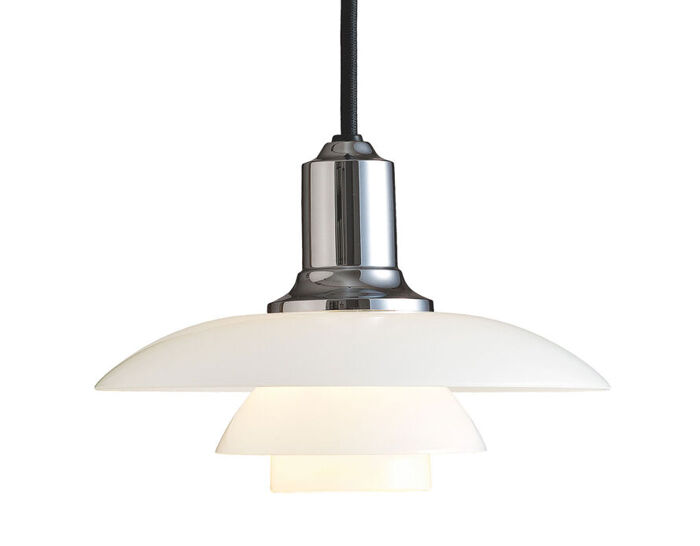ph 2/1 pendant lamp
by Poul Henningsen from Louis Poulsen - sale
ph 2/1 pendant lamp
Design Poul Henningsen, 1926
White opal glass, chrome plated or black finish
Made in Denmark by Louis Poulsen
"...it is an art to make light both economical and glare free." - Poul Henningsen
PH 2/1 pendant is a member of the of the PH 3-shade family principles, which were developed in the winter of 1925-26 for a large exhibition hall in Copenhagen, Denmark called "Forum". The combination of diffused reflection and a logarithmic shade curve gave PH the opportunity to control a fixture's glare and shading, as each shade would evenly decrease the amount of light emitted according to their distance from the bulb. The PH fixtures were designed as a rational lighting system where the size of the shade, its material, and its surfaces could be combined mutually according to the nature of the assignment. The PH3-shade system started out as a pendant solution but very quickly it also developed into other kinds of fixtures and chandeliers.
Poul Henningsen's lifelong collaboration with Louis Poulsen Lighting began in 1925 and lasted until his death. To this day, Louis Poulsen Lighting still benefits from his genius. Poul Henningsen's pioneering work concerning the relations between light structures, shadows, glare, and color reproduction-compared to man's need for light remains the foundation of the lighting theories still practiced by Louis Poulsen Lighting.
PH 2/1 pendant provides soft illumination. It is based on the principle of a reflecting multi-shade system, producing glare free illumination. The fixture is offered with white, handblown opal glass shades and a choice of black metalized, brass metalized, or chrome plated spun aluminum. The canopy is white and includes a 12' foot cord.
5.5" h | 7.9" dia. | black cord: 144" | 2.1 lbs | UL listed | IP20
light source: 1x 20W E12 G16.5 bulb (not included)
dimmable (dimmer not included, please reference manufacturer's specifications)
White opal glass, chrome plated or black finish
Made in Denmark by Louis Poulsen
"...it is an art to make light both economical and glare free." - Poul Henningsen
PH 2/1 pendant is a member of the of the PH 3-shade family principles, which were developed in the winter of 1925-26 for a large exhibition hall in Copenhagen, Denmark called "Forum". The combination of diffused reflection and a logarithmic shade curve gave PH the opportunity to control a fixture's glare and shading, as each shade would evenly decrease the amount of light emitted according to their distance from the bulb. The PH fixtures were designed as a rational lighting system where the size of the shade, its material, and its surfaces could be combined mutually according to the nature of the assignment. The PH3-shade system started out as a pendant solution but very quickly it also developed into other kinds of fixtures and chandeliers.
Poul Henningsen's lifelong collaboration with Louis Poulsen Lighting began in 1925 and lasted until his death. To this day, Louis Poulsen Lighting still benefits from his genius. Poul Henningsen's pioneering work concerning the relations between light structures, shadows, glare, and color reproduction-compared to man's need for light remains the foundation of the lighting theories still practiced by Louis Poulsen Lighting.
PH 2/1 pendant provides soft illumination. It is based on the principle of a reflecting multi-shade system, producing glare free illumination. The fixture is offered with white, handblown opal glass shades and a choice of black metalized, brass metalized, or chrome plated spun aluminum. The canopy is white and includes a 12' foot cord.
5.5" h | 7.9" dia. | black cord: 144" | 2.1 lbs | UL listed | IP20
light source: 1x 20W E12 G16.5 bulb (not included)
dimmable (dimmer not included, please reference manufacturer's specifications)
Poul Henningsen
Poul Henningsen practiced traditional functionalistic architecture. This led him to focus on what he would become most well-known for; lighting. During the German occupation he became part of a Danish colony of artists living in Sweden.
Louis Poulsen designs are based on the principle that form follows function. Innovative designs and quality materials are instrumental in producing Louis Poulsen iconic lighting.








 write a review now
write a review now
